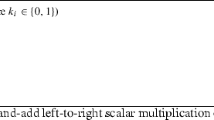Abstract
We show that timely induction of random failures can potentially be used to mount very cost effective attacks against smartcards deploying cryptographic schemes based on (right-to-left) modular exponentiation. We introduce a model where an external perturbation, or glitch, may cause a single modular multiplication to produce a truly random result. Based on this assumption, we present a probabilistic attack against the implemented cryptosystem. Under reasonable assumptions, we prove that using a single faulty signature the attack recovers a target bit of the secret exponent with an error probability bounded by \(\frac 3 7\). We show the attack is effective even in the presence of message blinding.
Author’s address: Dipartimento di Sistemi e Informatica, Viale Morgagni 65, I–50134 Firenze, Italy. Email: boreale@dsi.unifi.it. Work partially supported by the eu within the fet-gc2 initiative, project sensoria, and by University of Firenze, projects ”ex-60%”.
Preview
Unable to display preview. Download preview PDF.
Similar content being viewed by others
References
Anderson, R.J., Bond, M., Clulow, J., Skorobogatov, S.: Cryptographic processors – a survey, Technical Report UCAM-CL-TR-641, University of Cambridge, Computer Laboratory (August 2005)
Anderson, R.J., Kuhn, M.J.: Tamper resistance − a cautionary note. In: The second USENIX Workshop on Electronic Commerce proceedings (November 1996)
Anderson, R.J., Kuhn, M.J.: Low cost attacks on tamper-resistant devices. In: Security protocols 5th International Workshop, Paris (1997)
Aumüller, C., Bier, P., Hofreiter, P., Fischer, W., Seifert, J.-P.: Fault attacks on RSA with CRT: Concrete Results and Practical Countermeasures, Cryptology ePrint Archive: Report 2002/073 (2002)
Bao, F., Deng, R.H., Han, Y., Jeng, A., Nirasimhalu, A.D., Ngair, T.: Breaking Public Key Cryptosystems on Tamper Resistant Devices in the Presence of Transient Faults. In: Christianson, B., Lomas, M. (eds.) Security Protocols 1997. LNCS, vol. 1361. Springer, Heidelberg (1998)
Bar-El, H., Choukri, H., Naccache, D., Tunstall, M., Whelan, C.: The Sorcerer’s Apprentice Guide to Fault Attacks. In: Workshop on Fault Detection and Tolerance in Cryptography, Florence (2004); Also in Cryptology ePrint Archive: Report 2004/100 (2004)
Biehl, I., Meyer, B., Müller, V.: Differential Fault Attacks on Elliptic Curve Cryptosystems. In: Bellare, M. (ed.) CRYPTO 2000. LNCS, vol. 1880, p. 131. Springer, Heidelberg (2000)
Biham, E., Shamir, A.: Differential fault analysis of secret key cryptosystem. In: Kaliski Jr., B.S. (ed.) CRYPTO 1997. LNCS, vol. 1294, pp. 513–525. Springer, Heidelberg (1997)
Boneh, D., De Millo, R.A., Lipton, R.J.: On the importance of checking cryptographic protocols for faults. Journal of Cryptology 14(2) (2001)
Knuth, D.E.: The art of computer programming, Seminumerical algorithms, 3rd edn., vol. 2. Addison Wesley, Reading (1997)
Kocher, P.: Timing attacks on implementations of diffie-hellman, RSA, DSS, and other systems. In: Koblitz, N. (ed.) CRYPTO 1996. LNCS, vol. 1109, pp. 104–113. Springer, Heidelberg (1996)
Kocher, P., Jaffe, J., Jun, B.: Differential Power Analysis. In: Wiener, M. (ed.) CRYPTO 1999. LNCS, vol. 1666, p. 388. Springer, Heidelberg (1999)
Quisquater, J.J., Piret, G.: A Differential Fault Attack Technique Against SPN Structures, with Application to the AES and KHAZAD. In: Walter, C.D., Koç, Ç.K., Paar, C. (eds.) CHES 2003. LNCS, vol. 2779, pp. 77–88. Springer, Heidelberg (2003)
Shamir, A.: How to check modular exponentiation. In: Fumy, W. (ed.) EUROCRYPT 1997. LNCS, vol. 1233. Springer, Heidelberg (1997)
Skorobogatov, S., Aderson, R.: Optical Fault Induction Attacks. In: Kaliski Jr., B.S., Koç, Ç.K., Paar, C. (eds.) CHES 2002. LNCS, vol. 2523, pp. 2–12. Springer, Heidelberg (2003)
Stinson, D.R.: Cryptography: Theory and Practice, 2nd edn. CRC Press, Boca Raton (2002)
Yen, S.-M., Joye, M.: Checking before output not be enough against fault-based cryptanalysis. IEEE Transactions on Computers 49(9) (2000)
Author information
Authors and Affiliations
Editor information
Editors and Affiliations
Rights and permissions
Copyright information
© 2006 Springer-Verlag Berlin Heidelberg
About this paper
Cite this paper
Boreale, M. (2006). Attacking Right-to-Left Modular Exponentiation with Timely Random Faults. In: Breveglieri, L., Koren, I., Naccache, D., Seifert, JP. (eds) Fault Diagnosis and Tolerance in Cryptography. FDTC 2006. Lecture Notes in Computer Science, vol 4236. Springer, Berlin, Heidelberg. https://doi.org/10.1007/11889700_3
Download citation
DOI: https://doi.org/10.1007/11889700_3
Publisher Name: Springer, Berlin, Heidelberg
Print ISBN: 978-3-540-46250-7
Online ISBN: 978-3-540-46251-4
eBook Packages: Computer ScienceComputer Science (R0)




